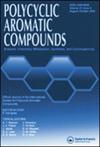通过反向度量分子网络的拓扑描述符
IF 2.4
3区 化学
Q2 CHEMISTRY, ORGANIC
引用次数: 0
摘要
卟吩和四卟吩是具有复杂环状结构的有机化合物。它们由四个吲哚环组成,四个吲哚环融合在一起形成一个更大的环状结构。物理学和化学界对这些结构进行了广泛的研究。由于其高度共轭体系,它们具有独特的电子和光学特性。在多个科学领域,它们被用作功能材料、分子电子学、传感器和催化的构件。为了从数据中得出拓扑指数,分子被表示成图,原子作为节点,键作为边。有许多不同的技术和算法可用于确定拓扑指数。我们对上述结构采用了基于反向度的方法。基于反向原子度的拓扑指数通过在分子网络中加入反向原子度序列来评估化合物的结构复杂性和稳定性。在本研究中,我们计算了卟吩(Pz)和四卟吩(TPz)网络的反向重定义萨格勒布指数、反向被遗忘指数、反向超萨格勒布指数、反向巴拉班指数、反向原子键连通性指数、反向几何算术指数和反向一般兰迪奇指数等基于反向度的拓扑指数。这项研究通过揭示分子结构、生物相互作用和化学反应性之间复杂的相互关系,增进了我们对物理和化学基本规律的了解。本文章由计算机程序翻译,如有差异,请以英文原文为准。
Topological Descriptors of Molecular Networks via Reverse Degree
Porphyrazine and tetrakis porphyrazine are organic compounds with intricate ring structures. They are made up of four indole rings that fuse together to form a larger cyclic structure. These structures have been extensively studied in physics and chemistry. They exhibit unique electronic and optical properties due to their highly conjugated systems. In several scientific domains, they are used as the building blocks for functional materials, molecular electronics, sensors, and catalysis. In order to derive a topological index from data, molecules are represented as graphs, with atoms acting as nodes and bonds acting as edges. There are many different techniques and algorithms that can be used to determine the topological index. We have used the reverse degree-based methodology for the mentioned structures. Reverse degree-based topological indices evaluate the structural complexity and stability of chemical compounds by adding the reversed atom degree sequence to their molecular networks. In this study, we calculated the reverse degree-based topological indices like the reverse redefined Zagreb indices, the reverse forgotten index, the reverse hyper-Zagreb index, the reverse Balaban index, the reverse atom bond connectivity index, the reverse geometric arithmetic index, and the reverse general Randić index for porphyrazine and tetrakis porphyrazine networks. This research advances our knowledge of the fundamental laws of physics and chemistry by illuminating the complex interrelationships between molecular structure, biological interactions, and chemical reactivity.
求助全文
通过发布文献求助,成功后即可免费获取论文全文。
去求助
来源期刊

Polycyclic Aromatic Compounds
化学-有机化学
CiteScore
3.70
自引率
20.80%
发文量
412
审稿时长
3 months
期刊介绍:
The purpose of Polycyclic Aromatic Compounds is to provide an international and interdisciplinary forum for all aspects of research related to polycyclic aromatic compounds (PAC). Topics range from fundamental research in chemistry (including synthetic and theoretical chemistry) and physics (including astrophysics), as well as thermodynamics, spectroscopy, analytical methods, and biology to applied studies in environmental science, biochemistry, toxicology, and industry. Polycyclic Aromatic Compounds has an outstanding Editorial Board and offers a rapid and efficient peer review process, as well as a flexible open access policy.
 求助内容:
求助内容: 应助结果提醒方式:
应助结果提醒方式:


